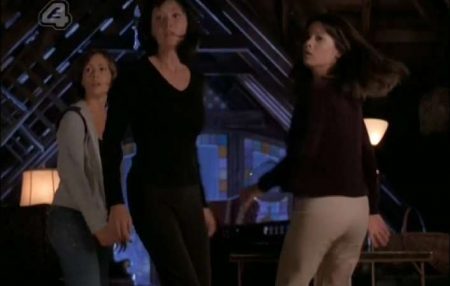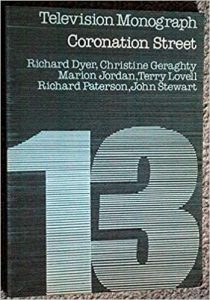It all started with Traumschiff (ZDF, since 1981).
https://youtube.com/watch?v=xG4cwnCym7A
Traumschiff is the German version of Love Boat (CBS, 1977-1986). It is less humorous and more melodramatic, but there is an element of self-deprecation about it: the main stars engage in a lot of winking and eye-twinkling. It stars Sascha Hehn, who avid viewers of German TV serials might recognise as the son of Dr Wusov from the Schwarzwaldklinik (Black Forrest Clinic, ZDF, 1985-1989). Yes, let us remind us of it:
https://youtube.com/watch?v=BAyZS5csEks
Did you feel the cringe of recognition? Was it, then or now, a guilty pleasure? If so, we are on the same page. I thoroughly enjoyed Schwarzwaldklinik. And when I was at home, in Germany, for Christmas, I thoroughly enjoyed Traumschiff. So much so, that I watched two back-to-back episodes. I binged on it, if you must.
What made the experience so interesting was not the momentary pleasure derived from it, but the reactions of my students to my confession that I had enjoyed this programme so much and my visible embarrassment about it. They looked at me with surprise – why was I embarrassed? They thought it looked great. They couldn’t understand the dialogue, but thought the production values were impressive. Hm, I thought. Hm.
A few days later, I got into a bit of an email banter with a colleague who found out that I preferred Charmed (The WB, 1998-2006) over Buffy (The WB, 1997-2001, UPN, 2001-2003). I explained that I was essentially Phoebe, and couldn’t relate to Buffy in the same way, but I apologised – yes, apologised – for my faulty value judgement. I understood that Buffy was clearly better. Clearly?

Figure 1: Still from Charmed ‘Something Wicca This Way Comes’ (Season 1, Episode 1). From left to right Phoebe (Alyssa Milano), Prue (Shannon Doherty), and Piper (Holly Marie Combs)
If you have read my blogs before, you know that the issue of value in television creeps up again and again. I think it largely stems from me coming out of the German system where television remains an undervalued medium both academically and culturally. There is only one Chair in Television Studies in the whole country, and I encountered television still largely as the bad object that needed to be systematised by new disciples of the Frankfurt School. It connects also to a long journey of feminist empowerment that has only recently allowed me to own up to my own internalised devaluation of everything feminine. As Deborah Jermyn phrased it so eloquently in a recent dossier for Critical Studies in Television: ‘I recall difficult soul-searching about how I could situate myself as a feminist while also wearing lipstick’ (2016: 377).
But what this coincidence of talking about value made me realise is that there are cultures, potentially, in which television studies have to operate in different countries. Depending on how we see television, we might value or indeed not value television studies. And even in countries such as the UK, Canada or the USA where television studies might well be established as an academic discipline (so much so, that even Screen and the SCMS now have strands of television studies running through their conference programmes and journal issues), there continues to be a hierarchy in terms of what TV is deemed study-able and what might not be a good object. Just think of all the invisible television that Brett Mills drew our attention to so well. Mills encourages us to pay more attention to the popular and go beyond what we would normally study because, as he puts it:
how television is talked about and the programmes that are analysed, discussed and taught, lead to a normalised understanding of what television is, what it is constituted of, what it does, who it is for and what is done with it. In all, then, this issue of Critical Studies in Television intends to constitute a significant intervention into our activities and the ways we define and justify the things that we do as researchers, as scholars, as teachers and as a community. And by highlighting that which is invisible it hopes to offer alternative directions for the development of television studies as a whole. (2012: 1).
Let us be honest: Have we heeded his call? Have we attempted to discuss more, a greater variety, etc. of programmes? I am putting my hand up and admit that ‘not really’. I am still primarily writing about crime drama and prime-time British and American drama at that. I make excuses to myself that it’s a result of not wanting to undermine my enjoyment of some of the other programmes – and in particular Charmed.[1] But what about Time Team (Channel 4, 1994-2014) which I am still catching (when I can) on More 4, or, another favourite of mine, Escape to the Country (BBC One and Two, since 2002)? And why, indeed, have I not written about the phenomenon that is Traumschiff? What makes us decide to pick out specific programmes? Mills suggests several reasons, including audiences, publishing demands, the focus on the new, television’s ordinariness, issues of access and methods and approaches. When talking about audiences, he points to our own likes to make sense of why some programmes have been discussed more than others:
As we are academics, so we are audiences. It is unsurprising that we commonly choose to write about those programmes that we find interesting, or addictive, or pleasurable. Indeed, it is often the case that it is those interests that spark our desire to work as academics in the first place. And it is that enthusiasm which commonly informs our teaching and becomes an impetus to our work as a whole. (p.5)
And he continues:
But by using our own interests as audiences as motivators to research and analysis we inevitably avoid those programmes that we are unlikely to encounter and/or enjoy. And as a profession with a demographic significantly unrepresentative of the general public, it is likely our tastes often differ from those of mass audiences. In his article Phil Wickham refers to a conversation he and I had about our colleagues’ ignorance of New Tricks (2003–present), which is highly significant considering its ratings. His analysis of New Tricks suggests the viewing habits of older people have largely been ignored in much media analysis, and certainly have not received as much attention as younger viewers (even if the analysis of children commonly works from concerns over effects of the medium on developing minds). This is particularly problematic considering the elderly consume more television than any other age group; by ignoring such behaviour we are writing out of our social history a significant proportion of everyday behaviour, and ignoring one of the key ways in which television is made sense of. Thinking about how and why some programmes are invisible might, then, be a spur to new ways of exploring currently neglected research areas. (p. 6)
Apologies for citing him in such length, but his point is just too good. But it also assumes something of us as academics, namely that we operate more like the younger generation, and that our tastes are different from the mass audience that consumes New Tricks. One of the pleasures of working at an institution with mostly working-class and lower middle-class students is that they highlight to me, again and again, how wrong some of these assumptions are (even if they have been researched by Ofcom). They, or at least some of them, loved New Tricks. As did I. At the moment, some of them love Death in Paradise, which, to be fair, I’m not that keen on (it’s OK), but I know colleagues who do like it. And yet, they are not writing about it.
I therefore think that the invisibility of some television in our field is connected to something else as well, something which our field has grappled with since its beginning: legitimacy. Or, to put it more Bordieuan: taste cultures and habita. As several scholars (see Brunsdon 1990, McCabe and Akass 2007, Newman and Levine 2012), who have investigated this highlight, Bourdieu’s concepts are useful in understanding how television is legitimated. Kim Akass and Janet McCabe (2018), for example, draw heavily on his concepts of ‘cultural field’, ‘capital’ and ‘habitus’ to investigate HBO’s role in favouring a particular kind of television, one which ‘validate[s] the taste values of those who validate HBO’. Akass and McCabe use the term ‘habitus’ in order to make sense of ‘a largely arbitrary set of unconscious arrangements of rules, norms and values governing the cultural consecration of HBO’. Habitus, as Bourdieu indicates, operates in any institutional and social context: in education, cultural production and cultural consumption. It directs how people behave because the social context is structured by these rules, norms and values which are internalised by most participants who operate in that context. Thus, we are clearly governed by the specific habitus in our field of Television Studies, but it would be wrong to assume that this doesn’t intersect with those of the academy more generally, or indeed the national culture we operate in more widely. And within these habita, taste is still defined along hierarchical lines. Before doing any further research, my assumption was that taste in relation to television and hence the legitimacy of specific forms of television studies would be specific to different countries as a result of television still connecting strongly with national cultures, particularly in Europe where it is regulated as national public utility. I was of course aware, at the same time, of the increased intersection of the national with the transnational (see Kuipers 2011, Esser, Smith and Bernal-Merino 2016) But, I wanted to find out how television is perceived in different countries and if this is connected to what kind of television studies is perceived as legitimate. And put it like this, the findings were interesting. But like a true serial television writer, I am going to keep you in suspense. In a number of blogs, to be published in the next few weeks, I am going to examine the responses in relation to different elements that cropped up in them: next week, it will be about politics.

Figure 2: Blast from the Past: An example of an early TV Studies publication in Britain that was clearly marked by a sense of having to defend itself as a legitimate publication.
Elke Weissmann is Reader in Film and Television at Edge Hill University. She is currently considering changing this to Reader in Television and Film, however. Her books include Transnational Television Drama (Palgrave) and the edited collection Renewing Feminisms (I.B.Tauris) with Helen Thornham. She sits on the board of editors for Critical Studies in Television. She migrated to the UK in 2002 after realising that German television was as bad as she remembered.
Footnote:
[1] And just to give you a sense of how important Charmed remains to fans – not only can you still watch it daily on E4, but the reboot looks more likely to happen this time. See e.g: http://www.nme.com/news/tv/first-witch-sister-cast-charmed-reboot-2246533



